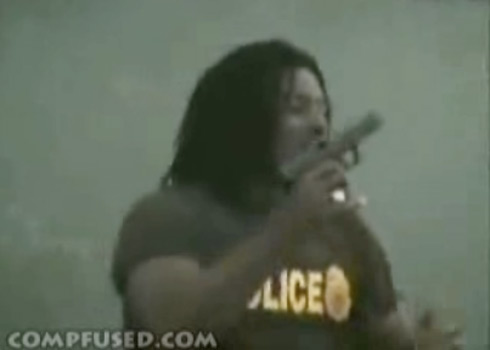A Drug Enforcement Agency agent who shot himself in the foot during a classroom demonstration in a video that went viral on YouTube is asking an appeals court to rule that the disclosure of the video was an invasion of privacy.
Former Tampa Bay Buccaneers and Tampa Bay Bandits football player and undercover agent Lee Paige first sued over the disclosure of the April 2004 video in April 2006. Now, Mike Scarcella of National Law Journal reports, he wants an appeals court to overturn a ruling that ended the suit in December.
“I am the only one in the room professional enough, that I know of, to carry this Glock 40,” Paige said just before he shot himself in the foot. He continued to deliver his presentation as he hobbled around the room, trying to turn it into a lesson for the children in the room.
The video not only made the rounds online but was shown on the Jay Leno Show, CNN HeadlineNews, Fox News and the Jimmy Kimmel Show according to court documents.
Paige first argued that the tape harmed his reputation, and said that the DEA had the only copy of the video, which he never agreed to have released. He said the video, filmed by a private videographer, had been taken into DEA custody and that he called his wife from the emergency room to tell the DEA to ensure a copy didn’t get out. Despite a two-year internal DEA investigation, they couldn’t identify the person who disclosed the video, according to court records.
A judge’s ruling in December said that, since the incident occurred in public while Paige was on duty, “there was no reason to believe” it would be protected under the Privacy Act.
“Given that the incident occurred in a public forum, in front of fifty parents and children while [Paige] was on duty at a DEA sponsored presentation and involved a public shooting incident, the Incident was a matter of public concern,” Senior Judge Jack Shanstrom of Montana federal district court wrote in a 20-page ruling, granting summary judgment in favor of the government.
“Even if Defendant were to give further publicity to it by allegedly divulging the 4:09 video, for purposes of the tort of ‘public disclosure of private facts,’ there would be no liability,” he wrote.
The video is embedded below.






